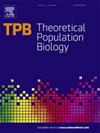A mathematical framework for time-variant multi-state kinship modelling
IF 1.3
4区 生物学
Q4 ECOLOGY
引用次数: 0
Abstract
Recent research on kinship modelling in demography has extended age-structured models (i) to include additional characteristics, or “stages” (multi-state kinship), and (ii) to time-variant situations. A wide variety of population structures can affect kinship networks. However, only one prior model has comprehensively considered such effects, and under specific assumptions relating to the nature of individuals’ stages. As such, the leading multi-state framework for kin is theoretically limited in scope, and moreover, has yet to be implemented under time-variant demographic rates. Generalising kinship models to encompass arbitrary population characteristics and extending them to time-dependent processes remain open challenges in demography.
This research proposes a methodology to extend multi-state kinship. We present a model which theoretically accounts for any stage, both in time-variant and time-invariant environments. Drawing from Markov processes, a concise mathematical alternative to existing theory is developed.
The benefits of our model are illustrated by an application where we define stages as spatial locations, exemplified by clusters of local authority districts (LADs) in England and Wales. Our results elucidate how spatial distribution – a demographic characteristic ubiquitous across (and between) societies – can affect an individual’s network of relatives.
时变多态亲属关系建模的数学框架。
最近对人口统计学中亲属关系模型的研究扩展了年龄结构模型(i),以包括额外的特征或“阶段”(多状态亲属关系),以及(ii)到时变情况。各种各样的人口结构可以影响亲属网络。然而,只有一个先前的模型在与个体所处阶段的性质有关的特定假设下全面考虑了这种影响。因此,领先的多国家亲属框架在理论上是有限的,而且,在时变人口比率下尚未实施。推广亲属关系模型以涵盖任意人口特征并将其扩展到依赖时间的过程仍然是人口学中的开放挑战。本研究提出了一种扩展多国家亲属关系的方法。我们提出了一个模型,理论上可以解释任何阶段,无论是时变环境还是时变环境。从马尔可夫过程,一个简洁的数学替代现有的理论发展。我们的模型的好处通过一个应用程序来说明,我们将阶段定义为空间位置,以英格兰和威尔士的地方当局区(LADs)集群为例。我们的研究结果阐明了空间分布——一种跨社会(或跨社会)普遍存在的人口特征——如何影响个人的亲属网络。
本文章由计算机程序翻译,如有差异,请以英文原文为准。
求助全文
约1分钟内获得全文
求助全文
来源期刊

Theoretical Population Biology
生物-进化生物学
CiteScore
2.50
自引率
14.30%
发文量
43
审稿时长
6-12 weeks
期刊介绍:
An interdisciplinary journal, Theoretical Population Biology presents articles on theoretical aspects of the biology of populations, particularly in the areas of demography, ecology, epidemiology, evolution, and genetics. Emphasis is on the development of mathematical theory and models that enhance the understanding of biological phenomena.
Articles highlight the motivation and significance of the work for advancing progress in biology, relying on a substantial mathematical effort to obtain biological insight. The journal also presents empirical results and computational and statistical methods directly impinging on theoretical problems in population biology.
 求助内容:
求助内容: 应助结果提醒方式:
应助结果提醒方式:


